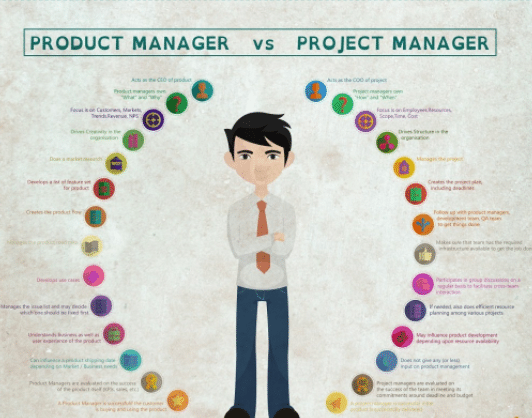It’s a question that often comes up in the world of business: what’s the difference between a product manager and a product designer? Both roles are responsible for overseeing projects, but there is a key distinction between the two positions.
What is a product manager?
A product manager is responsible for overseeing the development and success of a particular product. This can include developing strategies to market and sell the product, managing customer feedback, managing budgets and timelines, and overseeing the work of other teams or individuals involved in creating or selling the product. In many companies, product managers are responsible for working closely with both internal and external stakeholders, including developers, marketing teams, salespeople, and customers.
What is a project manager?
A project manager is responsible for overseeing the execution of a particular project or set of projects within an organization. This typically involves managing timelines, budgets, resources, goals, and deliverables for the project(s). Project managers are often involved in coordinating the efforts of other teams or individuals, and ensuring that all stakeholders are updated on progress throughout the project.
So what’s the difference between a product manager and a project manager?
In general, product managers tend to focus more on overseeing strategic aspects of a product (marketing, sales, feedback management), while project managers tend to focus more on the day-to-day operational aspects of a project (timelines, deliverables, resource coordination).
That said, there is often some overlap between these roles – particularly in larger organizations where teams or projects may be managed by product managers. Ultimately, it’s up to each organization to decide how they want to structure these roles to best meet their specific needs.
The role of a product manager
Well, to cut long story short, a product manager is responsible for overseeing all aspects of a product development process. This can involve working with internal stakeholders such as developers, designers, marketing teams, and salespeople – as well as external stakeholders like customers or partners. Product managers are usually tasked with managing deadlines, budgets, and resources to ensure that the final product meets the needs and expectations of both the organization and its customers.
The role of a project manager
In contrast, project managers are responsible for managing the day-to-day operations of a particular project or set of projects. This typically involves coordinating the efforts of multiple teams and individuals, ensuring that all goals and deadlines are met on time and within budget. Project managers may also be involved in setting or communicating overall project goals to stakeholders, providing regular updates on progress, and identifying potential risks or areas of improvement.
How do they work together?

While there is some overlap between the roles of product managers and project managers, these two positions can also be quite distinct. In larger organizations that may have multiple products or projects being managed at once, it often makes sense to have a single individual overseeing all aspects of product management – thus leading to the creation of a dedicated role for a product manager.
However, in smaller organizations where a single individual may be tasked with managing multiple products or projects at once, it is more common to have a dedicated project manager who oversees all operational aspects of the development and implementation process. At the end of the day, whether you’re working as a product manager or a project manager will depend on the needs and organizational structure of your particular company or team. But whatever your role may be, it’s important to have strong leadership, communication, and project management skills to succeed in these positions.
So which role is right for you?
Ultimately, it depends on your skills and interests – as well as the needs of your organization. But if you’re someone who is energized by managing projects and ensuring that goals are met, then a career in project management might be right for you. And if you’re passionate about understanding customer needs and developing strategies to meet those needs, then a career in product management might be the right choice. Either way, there are plenty of opportunities in both fields, so the key is to find the role that best fits your skills and interests!
Salary and career growth for product managers and project managers
Of course, it can vary widely, depending on factors such as experience level, industry, and company size. For example, according to Glassdoor, the average salary for a product manager in the US is around $112,000 per year, while the average salary for a project manager is closer to $85,000 per year. That said, salaries and career growth potential can vary widely depending on factors such as experience level and industry.
On the other hand, many product managers and project managers enjoy excellent career growth opportunities – with some reporting salary increases of up to 50% or more within a few years. So if you’re interested in a dynamic and rewarding career in either of these fields, it’s a good idea to start building your skills and experience as early as possible! Whether you choose to pursue a career as a product manager or project manager, there are plenty of opportunities for career growth and success. So why not start exploring these roles today?
How to become each type of manager
There is no single path to becoming a product manager or project manager – the skills and experience required can vary depending on your organization, industry, and role. That said, some general tips can help you get started in either field.
To become a product manager, one approach is to start by gaining experience working as a product marketing or strategic planning associate. This will help you understand the key features, benefits, and customer needs of various products, which can be essential for developing effective product strategies. Additionally, you may also want to build skills in areas such as project management, budgeting and forecasting, market research, and communications.
To become a project manager, one approach is to start by gaining experience in areas such as operations management and team leadership. This will help you develop the skills needed to manage teams, set deadlines, and balance multiple priorities. Additionally, having a strong understanding of industry best practices in areas such as risk management and change management can also be helpful for success in this role.
Also, there are plenty of online courses things like project and product management certifications that you can pursue to build your skills and knowledge. And regardless of which path you choose, it’s important to be willing to continuously learn and adapt in this fast-changing field. With the right skills and experience, there are plenty of opportunities for career success as a product manager or project manager.
Final Thoughts
Whether you’re interested in a career as a product manager or project manager, there are many factors to consider. These roles involve a lot of different skills and responsibilities, so it can be helpful to gain some experience in both areas – either through formal education or on-the-job training. Ultimately, the key is to find the role that best fits your interests and skills, so that you can enjoy a successful and rewarding career in product management or project management!





